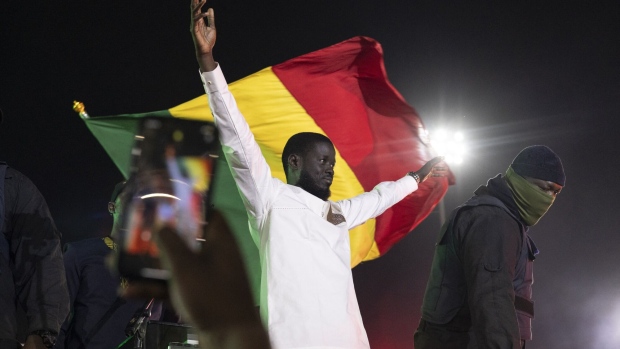Mar 25, 2024
Senegal Opposition’s Faye Set to Go From Prison to Presidency
, Bloomberg News

(Bloomberg) -- Senegalese opposition leader Bassirou Diomaye Faye is set to win the nation’s presidential election, a seismic shift in the political landscape of one of Africa’s fastest-growing economies.
The ruling coalition’s candidate, Amadou Ba, conceded defeat on Monday, handing an unexpected first-round victory to Faye — a political novice and former tax inspector who just 10 days ago was in prison on what supporters said were politically motivated charges. The outcome has yet to be confirmed by the Autonomous National Electoral Commission, which hasn’t released any official results yet.
Faye is the hand-picked candidate of opposition leader Ousmane Sonko, who’s been repeatedly jailed in recent years, like many of outgoing President Macky Sall’s political rivals. The pair captured the energy of Senegal’s large youth population — the median age is 18 — fed up with a political elite that’s done little to raise their living standards. Many took to the streets on Monday to celebrate Faye’s impending victory, singing “Happy Birthday” to mark his 44th birthday.
Ba was the chosen successor of Sall, who sparked chaos in what was long considered one of Africa’s most stable democracies when he postponed the election originally scheduled for February and floated holding onto power for an extra year. Senegalese staged mass protests, forcing Sall to back down and publicly state that he would leave office on April 2 — the move doomed what could have been an easy win for the ruling party.
“In view of the trends in the results of the presidential election and while awaiting the official proclamation, I congratulate President Bassirou Diomaye Diakhar Faye on his victory in the first round,” Ba said in a statement on Monday in the capital, Dakar.
At 44, Faye is set to become one of Africa’s youngest leaders. Until March 14, he’d been detained in a prison in Dakar after being charged with defamation and contempt of court. He was never convicted, and was freed under a government amnesty program.
Investor Nerves
Investors have been nervous about Faye winning the election. Senegal is on the cusp of becoming a major oil and gas producer, and Faye has pledged to review deals signed with international investors including BP Plc, Endeavour Mining Plc and Kosmos Energy Ltd. He’s also questioned whether Senegal should continue using the CFA franc — a euro-pegged regional currency — and pledged to review the nation’s business and economic ties with former colonial ruler France.
“Faye will be looking at renegotiating oil and gas contracts,” said Babacar Ndiaye, a political analyst with Dakar-based think tank Wathi. “He will be looking to get the most possible out of the deals.”
The yield on Senegalese eurobonds due in 2033 fell 24 basis points to 8.93% by 3:36 p.m. in London, while the rate on its 2037 debt dropped 22 basis points to 9.21%. Ba’s concession was risk positive as it removed the risk of tensions that have built up had the vote gone to a runoff, Oxford Economics said in a note.
“The key thing to watch will be his economic team appointments as the market is worried about” his stance on the CFA franc and the energy contracts, said Thys Louw, a portfolio manager at Ninety One Plc. “If they appoint a team with strong technocratic credentials, that will allay fears on those issues as well as signal willingness to continue with IMF program.”
Stabilizing debt — currently about 80% of gross domestic product — was a key focus of the outgoing administration, which is implementing an International Monetary Fund-endorsed fiscal consolidation strategy.
Currency Reform
Faye’s campaign has shown signs of toning down its ambitions for currency reform, because Senegal is too small to go it alone by abandoning the CFA franc and creating its own currency, Ndiaye said. More pressing issues include the high cost of living and unemployment in Senegal, that the government will need to attend to urgently, he said.
Despite his association with Sall’s democratic overreach, Ba offered investors the prospect of policy continuity. Under Sall, gross domestic product expanded more than 5% annually over the past decade, and his administration invested heavily in new roads, hospitals and electricity infrastructure, even as it cracked down on opposition, jailed critics and periodically shut down the internet.
Faye’s anti-establishment Pastef party benefited both from the backlash against Sall’s attempt to postpone the election and his crackdown on more established opposition parties have been weakened over his two terms in office.
Sonko criss-crossed the country with Faye after their release from prison. He also won support from the Senegalese Democratic Party, PDS, founded by Sall’s predecessor, Abdoulaye Wade.
Faye hails from a family of farmers. After being educated at the prestigious École Nationale de l’Administration in Dakar, he rose to prominence as a labor-union leader before joining Pastef — the party founded by Sonko that was dissolved by the government last year.
Faye has no experience working in government. He previously worked under Ba as a tax inspector, and unsuccessfully ran for mayor of his hometown — Ndiaganiao — in 2022.
--With assistance from Yinka Ibukun and Colleen Goko.
©2024 Bloomberg L.P.





